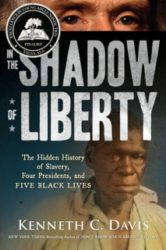March 16 marks the anniversary of the birth in 1751 of America’s fourth President, James Madison, also known as “The Father of the Constitution.”
Like George Washington and Thomas Jefferson, his Virginia predecessors in the presidency, Madison embodied the “Great Contradiction”– that a nation “conceived in liberty” was also born in shackles.
READ MY ARTICLE “THE AMERICAN CONTRADICTION,” on teaching the history of American slavery in Social Education.
Small in stature and overshadowed by the more famous Washington and Jefferson, Madison is counted among of the greatest of the Founding Fathers for the breadth and influence of his contributions. Like many of the Founders, Madison had reservations about slavery as a contradiction to this ideals, but did little to end the institution. He hoped that slavery would end after the foreign trade was abolished and thought that enslaved African-Americans should be emancipated and returned to Africa.
The story of Paul Jennings, who was enslaved by Madison and wrote a memoir of working as a servant in the White House, is told in my book IN THE SHADOW OF LIBERTY.
James Madison was born on March 16, 1751 in Port Conway, Virginia. The son of a tobacco planter and somewhat sickly as a child, he went north to study at the College of New Jersey (now Princeton). There he came under the influence of the college President, John Witherspoon, a future signer of the Declaration of Independence, and made a friend of fellow student, Aaron Burr, son of the College’s founder.
Returning to Virginia, Madison became involved in patriot politics and became a close colleague of his neighbor Thomas Jefferson, serving as Jefferson’s adviser and confidant during the war years while Jefferson was Governor of Virginia.
In 1794, he married the widow Dolley Payne Todd, having been formally introduced by his college friend Aaron Burr.
A few Madison Highlights:
•Secured passage of the Virginia Act for Establishing Religious Freedom (1786), an act that is a cornerstone of religious freedom in America. As part of that effort, he wrote the influential Memorial and Remonstrance Against Religious Assessments. (I discuss the “Remonstrance” in my article “America’s True History of Religious Tolerance” in the October 2010 Smithsonian.)
•Was the moving force behind the Constitutional Convention and was one of the principal authors of the Constitution. Madison’s support of the electoral system is laid out in this essay by Yale professor Akhil Reed Amar “The Troubling Reason the Electoral College Exists.”
•With Alexander Hamilton and John Jay was one of the authors of The Federalist Papers (Resources from the Library of Congress), arguments in favor of the ratification of the Constitution
•Was principal author of the Bill of Rights, which he originally thought unnecessary
Following ratification of the Constitution, Madison was a member of the House of Representatives from Virginia and a powerful Congressional ally of George Washington.
•Drafted the first version of Washington’s Farewell Address
•Supervised the Louisiana Purchase as Thomas Jefferson’s Secretary of State
•Presided over the ill-prepared nation during the War of 1812, the “second war of independence”
I believe there are more instances of the abridgment of the freedom of the people by gradual and silent encroachments of those in power than by violent and sudden usurpations. –June 16, 1788
Madison died on June 28, 1836 at Montpelier, at age 85. Enslaved servant Paul Jennings was at his bedside and later recalled in a memoir that Madison died, “as quietly as the snuff of a candle goes out.”
James Madison is buried at Montpelier.

LINKS:
The Library of Congress Resource Collection on James Madison.
Madison’s Major Papers and Inaugural Addresses can be found at the Avalon Project of the Yale Law School.